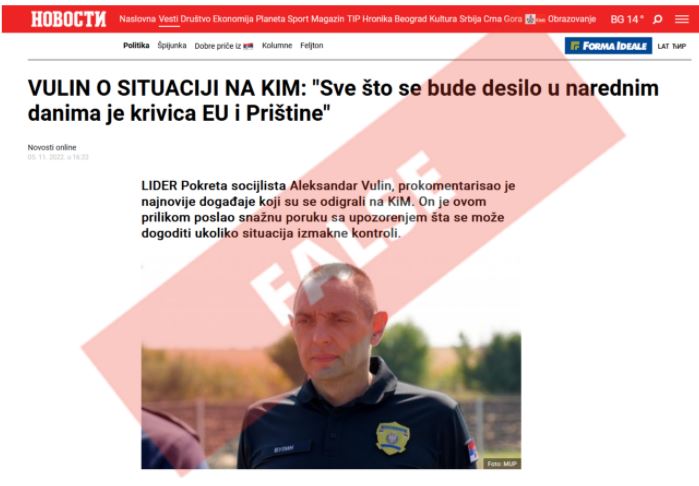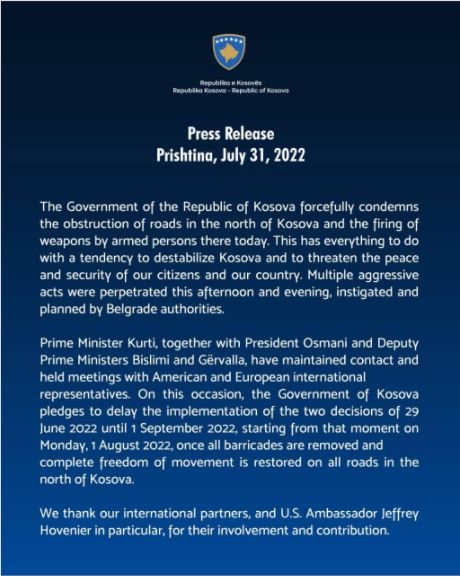Aleksandar Vulin, Serbia’s former minister of internal affairs and founder of the political party Movement of Socialists, partly blames the European Union for the escalating situation in Kosovo, which is connected to Kosovo’s decision to change the license plate policy. This claim turns out to be false.
Serbian newspaper Novosti quotes Vulin’s claim, made on the 5th of November: “The European Union is to blame for everything that will happen in Kosovo in the coming days. It has not fulfilled its role as a guarantor and sponsor of the Brussels Agreement.” This agreement, signed in 2013, was concluded to normalize relations between Serbia and Kosovo, two nations that have suffered a violent ethnic conflict.
Several other Serbian publications, including Borba and Politika Online, as well as the Russian news agency TASS, also cited Vulin’s words. The politician’s full quote also includes criticism towards the Kosovar government. This claim, however, will not be covered in this article.

Escalation in Kosovo
Vulin made the claim about the European Union in the midst of the increasing tension in the conflict in Kosovo, which independence Serbia has not recognized, in November 2022. The reason for increasing levels of tension between Kosovo and Serbia was Kosovo’s decision to change personal documents and license people from Serbian people living in Kosovo to Kosovan ones, which was announced in the summer 2022. The decision was delayed by Kosovo’s Prime Minister Albin Kurti due to displeasure by Serbians in Kosovo’s northern regions.

A few months later, in the beginning of Autumn, Prime Minister Albin Kurti again announced the deadline for changing documents and license plates to be 31st of October. On November 1st, the Kosovan police began issuing the first warnings to drivers of automobiles that still had Serbian license plates. Serbs living in Kosovo’s northern regions opposed to these changes, and resigned from public institutions. After this, Vulin issued his statement. It is important to highlight that speaking out about and criticizing the European Union is not unusual for Vulin; he has accused the EU of hypocrisy before in October 2022.
The Brussels Agreement
Serbia and Kosovo signed the Brussels Agreement on April 19, 2014. The High Representative at the time, Baroness Catherine Ashton, served as a mediator between Kosovo’s Prime Minister Hashim Thaçi and Serbia’s Prime Minister Ivica Dačić.
The Brussels Agreement was the first agreement signed between Serbia and Kosovo aimed at normalizing relations. Besides that, the Brussels Agreement made it possible, according to the European commission’s claim, for Serbia to continue the conversation with the EU about an EU-membership, since a country cannot be in conflict with another country while joining the EU. For Kosovo, after signing the agreement, it would be possible to start initializing the Stabilization and Association Agreement (SAA), a first step towards an EU-membership.
However, only the last two points mention the EU. The two points in which the EU is mentioned, are as follows:
- Point fourteen: “It is agreed that neither side will block, or encourage others to block, the other side’s progress in their respective EU path.”
- Point fifteen: “An implementation committee will be established by the two sides, with the facilitation of the EU.”
No EU role?
The most important argument is the Brussels Agreement’s omission of mentioning the European Union’s obligations as a sponsor and guarantor. This raised doubts about Vulin’s claim. The two parts of the document that discuss the EU don’t actually employ phrases such as “guarantor” or “sponsor”.
Catherine Ashton was the High Representative of the European Union for Foreign Affairs and Security Policy and First Vice President of The European Commission from 2009 to 2014. Moreover, she is credited with the development of the Brussels Agreement.
In a reaction to EUfactcheck, baroness Ashton reaffirmed the lack of a formal role for the EU in the Brussels Agreement. Herspokesperson stated: “The original document does not include a specific role for the EU,” but then noted that “the role might have evolved under Baroness Ashton’s successors.” Ashton’s spokesperson said that Ashton herself suggested EUFactcheck reached out to the current High Representative in Brussels.
Peter Stano’s comment
In turn, Peter Stano, lead spokesperson of the current High Representative, Josep Borrell, denied that “the EU’s role in the dialogue has changed.”
Stano also noted: “The agreements reached in the Dialogue are made solely between Kosovo and Serbia, under the EU’s facilitation. At the same time, the EU is the guardian of these agreements, which means that the EU monitors the implementation of the agreements, reports on progress to EU member states, and interprets the agreements in case of diverging views.”
According to Stano, it is therefore possible to discuss the EU’s involvement in the agreement and resolution of the conflict between Serbia and Kosovo, but not in the capacity of sponsor or guarantor.
Viola von Cramon-Taubadel’s comment
Viola von Cramon-Taubadel, European Parliaments Standing Rapporteur of Kosovo, replied to EUfactcheck’s request for comment as followes: “The EU is indeed a facilitator in the process, as stipulated per Art. 15. It stems from the given Article, as well as the fact that the EU has co-signed the Agreement, that it is one of the parties that guarantees it’s proper and timely implementation.” She added: “The EU’s duty is to be a fair broker/facilitator of the Dialogue, to guarantee the establishment of the 2013 Agreement provisions and to oversee its implementation.” According to the MP the only role the EU has in the Brussels Agreement is to assure the agreement is implemented.
Aleksandar Vulin and the Movement of Socialists
Aleksandar Vulin did not respond to EUfactcheck’s multiple requests for comment via email or phone. Also three emails to the Movement of Socialists were equally disregarded.
CONCLUSION
As Ashton, Stano and Von Cramon-Taubadel all have acknowledged, the Brussels Agreement makes no mention of the European Union’s responsibility as a sponsor or guarantor. This makes it difficult to claim that the EU is responsible for tension between Kosovo and Serbia, which was connected with the license plate policy.
As was mentioned, the EU took part in the creation of the Brussels agreement and still tries to regulate relationships between countries. For instance, the EU intervened in the conflict and later Kosovo and Serbia announced that they found the solution. However, the EU’s desire to calm tension between countries were not written in the agreement.
It is important to note that the Brussels Agreement is the only agreement with this name. Hence, it cannot be assumed that Vulin was talking about a different document.
RESEARCH | ARTICLE © Mara Gallicola and Anastasiia Kalugina, HU University of Applied Sciences Utrecht, The Netherlands, and Thomas More University, Mechelen, Belgium.
Leave your comments, thoughts and suggestions in the box below. Take note: your response is moderated.





